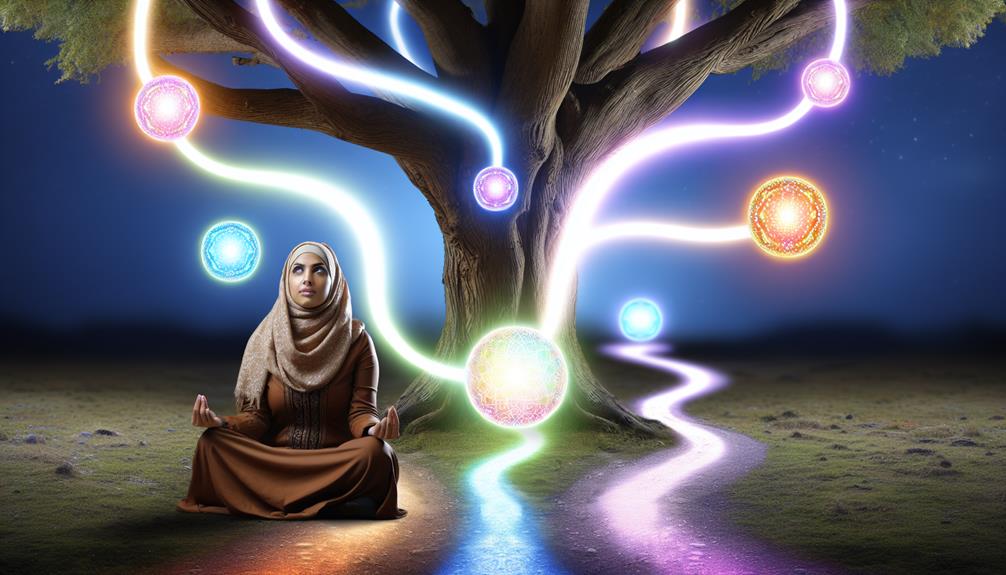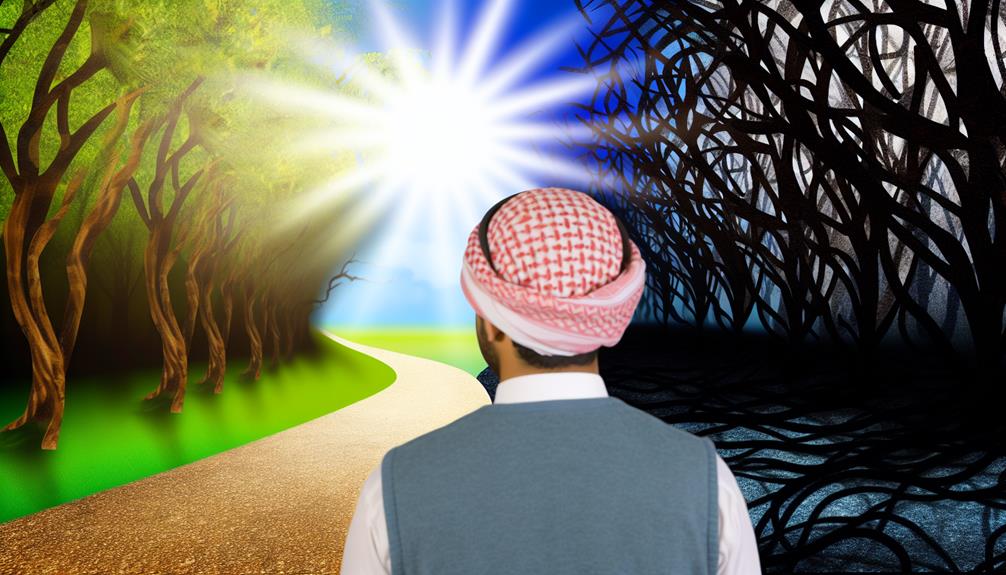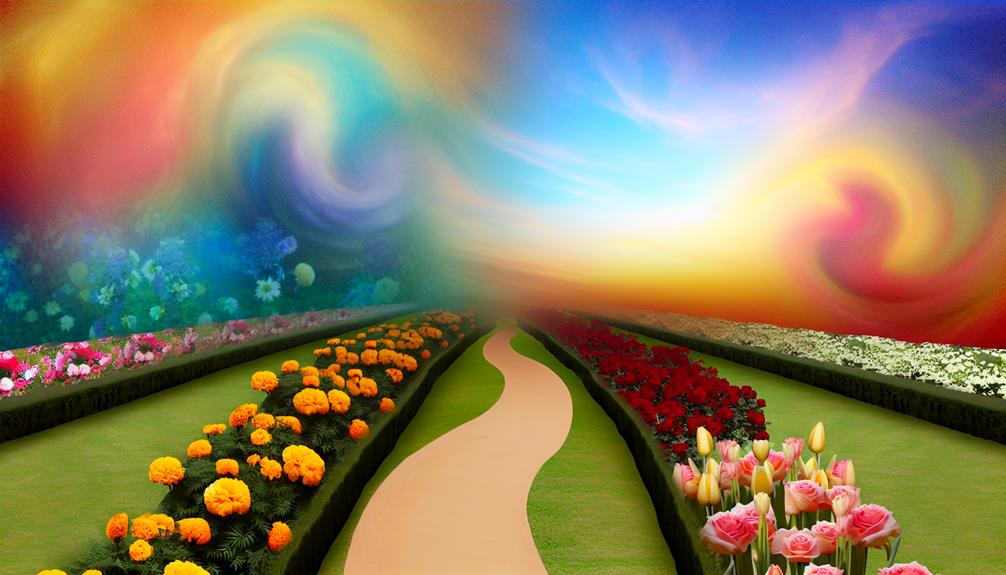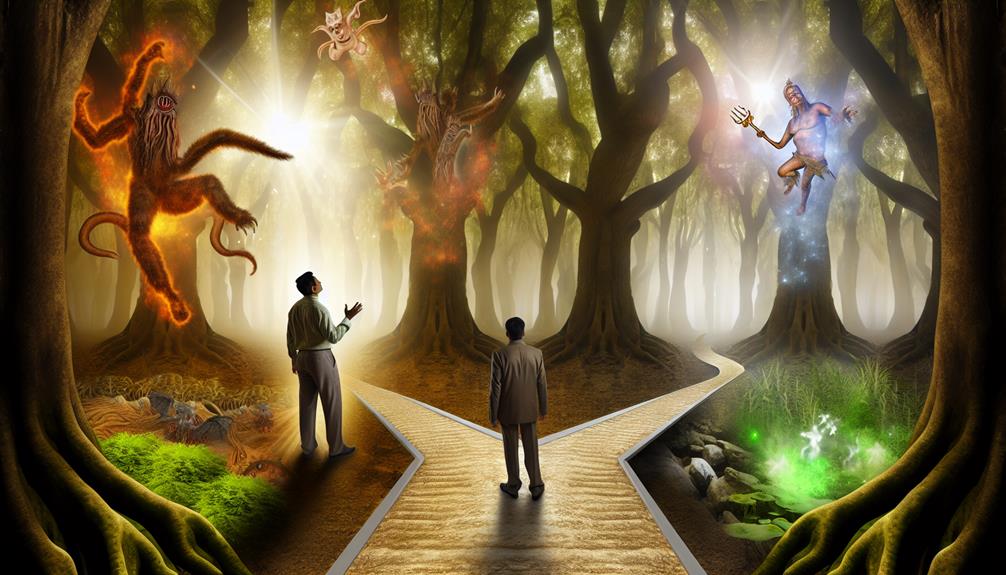
Exploring free will‘s spiritual implications, you’re engaging with a layered concept that shapes your moral and spiritual identity in a profound manner. As you navigate decisions, consider how each choice impacts your karma and contributes to your soul’s evolution. By aligning your actions with divine guidance, you fine-tune your intuition and co-create your reality with the universe, enhancing your spiritual growth. Ethical dilemmas invite deep reflection, urging you to balance destiny and choice, and ultimately, sculpt your ethical landscape. Understanding these dynamics offers a path to profound personal transformation and a richer spiritual life, inviting further exploration into how your choices define who you are.
Key Takeaways
- Reflect on how your choices align with your spiritual values to enhance personal growth and ethical living.
- Consider the role of divine guidance in decision-making to understand the balance between fate and free will.
- Use intuition as a tool to connect with deeper spiritual insights and co-create your reality with the universe.
- Assess how your decisions impact karma, focusing on generating positive outcomes for spiritual evolution.
- Explore the ethical consequences of your choices to contribute positively to the community and shape your spiritual identity.
Understanding Free Will Basics
Understanding free will begins by recognizing its role as the cornerstone of human agency. As you investigate the philosophical debates surrounding this concept, you’ll find that the implications of free will are profound and multilayered. It’s not just about choosing between coffee or tea; it’s about the essence of what makes you autonomous and capable of shaping your destiny.
Philosophers argue over whether free will is an illusion dictated by neurological processes or a real, tangible aspect of humanity. These debates lead you into profound existential questions. What does it mean to be responsible for your actions if every choice is predetermined?
The spiritual implications are immense. If free will is real, it supports the idea that you’re more than a set of chemical reactions; you’re a being capable of transcending your circumstances. This perspective doesn’t just influence how you view yourself but also how you engage with the world.
Every decision could be seen as a step in a journey of spiritual growth and understanding, where choices reflect deeper beliefs and values rather than mere reactions to external stimuli. As you ponder these issues, remember that the exploration of free will is fundamentally an exploration of what it means to be human.
Linking Choices to Spiritual Growth

In exploring the connection between your choices and spiritual growth, consider how each decision not only reflects but also shapes your core values and beliefs. Every choice you make serves as a stepping stone in your spiritual evolution, subtly carving out the path you follow.
This continuous interaction between decision-making and spiritual development fosters a deeper understanding of your personal ethos and its alignment with the universe’s broader spiritual framework.
Your journey through spiritual evolution isn’t just about reaching a higher state of awareness; it’s intricately linked with the cultivation of your ethical development. Each ethical decision contributes to this process, reinforcing or sometimes challenging your beliefs and principles.
As you navigate through life’s complexities, the choices you make can either strengthen your spiritual resolve or prompt you to reevaluate and adjust your trajectory.
You’re not just making decisions; you’re sculpting your spiritual identity. This active engagement in shaping your ethical and spiritual framework is vital.
It’s through this that you truly engage with the essence of free will, understanding that your choices aren’t just isolated events but pivotal moments that define and refine your spiritual and ethical landscape.
The Role of Ethics in Free Will

You must consider how moral accountability in your choices reflects the broader implications of free will.
Ethical decision-making frameworks provide a structure that guides you in aligning your actions with your spiritual values. This alignment is pivotal in understanding the interplay between ethics and free will, shaping not just personal integrity but also collective spiritual evolution.
Moral Accountability in Choices
When considering the concept of free will, examining how moral accountability influences our choices becomes crucial. You see, embracing free will isn’t just about recognizing your power to choose; it’s also about understanding the weight of moral responsibility that accompanies each decision.
Each choice you make carves out a path not only for you but also impacts others around you. This intertwining of decisions and their consequences forms the backbone of ethical living.
You’re held accountable because your choices can either uphold or violate moral standards. Consider how every decision you make sends ripples through the social and ethical fabric of your community.
If you choose to lie, steal, or harm another, you’re not only making a choice in isolation but are also setting a precedent about what’s acceptable in your sphere of influence.
Thus, moral accountability isn’t merely a personal affair; it extends beyond the individual to the broader ethical ecosystem. Your decisions contribute to shaping the moral landscape in which we all live.
It’s crucial to weigh your choices carefully, understanding that each one has the potential to reinforce or challenge the moral norms that bind your community together.
Ethical Decision-Making Frameworks
Several ethical decision-making frameworks can guide you through the complex landscape of choices enabled by free will. When you face ethical dilemmas, these frameworks help unravel the threads of moral complexity and guide your decision-making process.
The most prominent among these is the utilitarian approach, which urges you to contemplate the greatest good for the greatest number. However, it’s essential to balance this with deontological ethics, which prioritize duties and rights regardless of the outcome.
You must also reflect on virtue ethics, which focus on the development of your character and the pursuit of moral excellence. This framework encourages you to inquire not just what you should do, but what kind of person you should aspire to be.
Each of these frameworks brings a unique perspective to your decision-making process, providing a thorough view that respects the nuances of human free will.
As you navigate through your choices, remember that these frameworks aren’t mutually exclusive but can be integrated to enrich your ethical decision-making. By applying these principles thoughtfully, you’ll not only resolve dilemmas more effectively but also deepen your understanding of what it means to act freely and ethically.
Decision-Making and Divine Influence

You may wonder how divine guidance impacts your everyday decisions, particularly when you face moral dilemmas.
The concept that your choices might’ve ethereal origins poses significant questions about the autonomy you believe you possess.
Divine Guidance Impact
In the domain of spiritual beliefs, divine guidance often plays a pivotal role in shaping how decisions are made. When you explore the intricacies of divine intervention and spiritual guidance, you’re confronted with the complex interplay between fate and choice. It’s not just about unseen forces dictating your path; rather, it’s about how these forces interact with your personal agency.
You might wonder how much of your life is predestined and how much you can actually influence. This is where the concept of a higher purpose enters. Divine guidance suggests that there’s a plan, a sort of cosmic itinerary that you’re meant to follow. However, recognizing this guidance can profoundly influence how you make decisions. It’s not merely about submission to fate but about understanding the partnership between your will and the divine will.
Consider how spiritual guidance manifests. It often isn’t direct or overt but subtle—nudging you through intuition or coincidences rather than explicit directives. This nuanced approach allows you to exercise free will while still aligning with a divine framework. Thus, your decision-making process becomes a reflection of both divine influence and personal choice, embodying a dual allegiance to your earthly desires and your spiritual obligations.
Choices’ Ethereal Origins
As we consider divine guidance’s role in decision-making, it becomes apparent that the origins of our choices may be more ethereal than previously acknowledged. You’re often guided by a blend of personal intuition and external influences, but what if the essence of your decisions stems from a deeper, spiritual origin? This notion isn’t just about religious belief; it’s about understanding how ethereal choices connect you to a broader existential framework.
You might find that your decisions aren’t solely products of logical reasoning or emotional impulses. Instead, consider them as manifestations of a spiritual narrative that’s intricately woven into your life’s fabric. Each choice could potentially be a reflection of divine influence, guiding you subtly towards your destiny. This perspective shifts how you view free will—it’s not just autonomy but a dance with the divine.
The implications of acknowledging spiritual origins in your decision-making process are profound. They introduce a layer of responsibility and purpose that transcends mundane decision-making. Every minor choice gains significance when viewed as part of a larger, divinely influenced tapestry.
This recognition of the ethereal nature of your choices can transform how you live, leading you towards a more mindful and purpose-driven existence.
The Impact of Free Will on Karma

Within the framework of spirituality, your choices exert profound influences on the concept of karma, which records the moral debts and credits accumulated through your actions. Every decision you make sends out free will’s ripple into the universe, impacting not only your immediate environment but also the broader karmic balance.
This ripple can either cleanse or clutter your spiritual ledger, depending on the nature of your choices. Karmic consequences aren’t simply about retribution; they’re about learning and spiritual recalibration. When you choose actions aligned with higher moral and ethical standards, you generate positive karma, which fosters beneficial returns.
Conversely, negative choices tend to attract hardships, which serve as lessons intended to guide you back towards a path of moral righteousness. Understanding this dynamic empowers you to shape your spiritual destiny consciously. It encourages a thoughtful examination of your daily decisions, urging you to ponder their long-term spiritual impacts.
How Choices Affect Soul Evolution

You’ve observed how decisions shape spiritual growth, recognizing that each choice propels your soul toward further evolution.
The interplay of karma and free won’t only dictates the trajectory of your spiritual journey but also refines your soul’s progression.
Understanding these dynamics allows you to navigate life’s complexities with greater wisdom and purpose.
Decisions Shape Spiritual Growth
Every choice you make plays an essential role in the evolution of your soul. As you navigate through life’s labyrinth, each decision isn’t just a mere selection between A and B; it’s a stepping stone towards spiritual transformation. This transformative journey is deeply embedded in the principles of personal growth and the cultivation of a deeper, more enlightened self.
Consider how decisions rooted in compassion, integrity, and wisdom foster a robust internal environment conducive to spiritual maturity. When you opt for actions that align with higher moral and ethical standards, you’re not just altering external outcomes. You’re also sculpting your inner landscape, refining your soul’s essence. This process, subtle yet profound, hinges on the consistent choices you make daily.
The act of choosing, in this light, isn’t trivial. It’s a powerful mechanism of spiritual evolution. Each choice impacts your soul’s trajectory, shaping its potential for enlightenment and growth.
In this perspective, your free will is a sacred tool, facilitating not just worldly navigation but also spiritual ascendance. Hence, understanding the weight of your decisions is pivotal—each one is a thread in the fabric of your spiritual destiny.
Choices Propel Soul Progress
As you face daily life’s numerous options, each decision actively propels your soul along its evolutionary path. These moments aren’t just fleeting; they’re crucial in the continuum of your soul progression. Each choice, whether minor or significant, contributes to a tapestry of experiences that define and refine your spiritual essence.
This phenomenon, known as choice evolution, suggests that the decisions you make aren’t isolated but are cumulative in their impact on your spiritual development. It’s vital to recognize the weight of this responsibility. By understanding that every choice can influence your soul’s trajectory, you’re more likely to act consciously and with greater reflection.
Think of your soul as being in a state of constant evolution, where each decision is a building block in your spiritual structure. This perspective empowers you to make choices that resonate more deeply with your core values and long-term spiritual goals. It invites a thoughtful approach to daily decisions, emphasizing their significance in your broader spiritual journey.
Hence, your choices aren’t just about exploring the world; they’re about sculpting your eternal identity. Each decision is a brushstroke in the portrait of your soul’s eternal journey, gradually shaping the masterpiece that’s your spiritual destiny.
Karma Influences Evolution Path
Karma fundamentally shapes your soul’s evolutionary journey by linking each decision to future consequences. As you navigate through life’s myriad choices, you’re not just crafting your immediate future but also sculpting your soul’s evolution path. Understanding karma’s influence can be transformative, encouraging you to make more conscious, ethical, and mindful decisions.
Here are key aspects to take into account:
- Intentionality Matters: Your intentions behind actions play an essential role in generating karma. Positive intentions tend to foster beneficial karma, steering your soul towards higher evolutionary spheres.
- Cyclic Nature of Karma: Karma isn’t a one-off event but a continuous cycle. Each action you take influences future situations, which in turn provide new platforms for further actions.
- Learning Through Experience: Life’s challenges are opportunities for growth. How you respond to these situations can either accelerate or hinder your soul’s evolution.
Karma’s influence on your evolution path is profound. It suggests that every act, every decision, is a thread in the fabric of your spiritual journey. By making choices aligned with higher moral and ethical standards, you’re not just affecting your current life but also shaping your soul’s trajectory in profound, everlasting ways.
Exploring Intuition and Free Will

Intuition often serves as the silent partner to free will, guiding decisions with an almost imperceptible influence. As you explore further into your spiritual journey, developing your intuition can greatly enhance your understanding of free will’s boundaries and possibilities. Intuition isn’t just a gut feeling; it’s a vital component of how you interact with divine influences and make decisions that resonate with your spiritual path.
Consider intuition as a whisper from the divine, gently nudging you towards choices that align with your spiritual growth. This subtle guidance is essential because it merges your personal freedom with divine orchestration, creating a dance between destiny and will. By honing your intuitive skills, you’re not just reacting to life’s events; you’re actively co-creating your reality with the universe.
Free will and intuition are hence not just interlinked; they’re co-dependent. Your ability to make free choices is enriched by the intuitive insights you receive, which are themselves influenced by divine presence. This interplay suggests that your spiritual growth and the development of intuition aren’t merely personal achievements but are facilitated by a higher power, guiding you through choices that shape your soul’s evolution.
The Consequences of Spiritual Decisions

Understanding the consequences of spiritual decisions invites you to reflect on how these choices reverberate through your life. Each decision you make carries weight, influencing not only your own journey but also impacting those around you. In exploring these decisions, it’s key to acknowledge the spiritual consequences and ethical implications inherent in your choices.
- Personal Growth: Spiritual decisions often prompt deep personal transformation, affecting your values and perspectives.
- Relationship Dynamics: Your choices can alter interactions with others, potentially deepening relationships or causing rifts based on shared or divergent spiritual views.
- Community Influence: On a broader scale, your spiritual decisions contribute to the cultural and moral fabric of your community, influencing collective norms and behaviors.
These decisions require thoughtful consideration because they shape not only your spiritual identity but also your ethical footprint in the world. As you navigate these choices, you’re not only defining who you’re but also who you aspire to be.
The ripple effect of your decisions underscores the interconnectedness of our spiritual and ethical lives, reminding you that each choice crafts a segment of your life’s narrative and the wider human story.
Balancing Destiny and Choice

Traversing the landscape between destiny and choice reveals a complex interplay, where your decisions shape the path you’re destined to follow. This exploration into fate versus choice isn’t just about determining what’s preordained and what’s within your control—it’s about understanding how these concepts coexist and influence your spiritual equilibrium.
You often find yourself pondering whether your choices genuinely steer your life or if they’re merely milestones along a pre-scripted route. This duality forms the core of many spiritual beliefs, highlighting the tension between determinism and free will.
On one hand, embracing fate might offer comfort, suggesting that your life follows a meaningful trajectory, designed for a greater purpose. On the other hand, championing choice empowers you, suggesting that your actions can indeed redirect this trajectory.
Achieving spiritual balance requires you to navigate these waters thoughtfully. Recognizing that both elements play a role in shaping your destiny can lead to a more harmonious understanding of your existence.
You’re not merely a puppet of fate nor solely a free agent of chaos; rather, you’re a traveler who uses insight from both domains to guide your journey. This balanced perspective fosters a deeper, more nuanced engagement with life’s spiritual dimensions.

Every individual inevitably faces moral dilemmas where the principles of free will demand careful navigation. When you’re confronted with choices that test your ethical boundaries, it’s your moral compass that often guides you. But how do you ascertain that your decisions align with both your personal values and the greater good?
Here are some strategies:
- Reflect Deeply: Before making a decision, take time to reflect on the possible outcomes and how they align with your core values.
- Seek Diverse Perspectives: Consulting with others can provide new insights and help you see the situation from angles you mightn’t have considered.
- Consider Long-term Impacts: Think about how your choice will affect not just the immediate future but also the long term.
These ethical dilemmas serve as a crucible for personal growth. The freedom to choose, a foundational aspect of free will, doesn’t just suggest autonomy; it imposes responsibility. You’re tasked with making choices that resonate with your deepest values while also considering their broader implications.
This balancing act isn’t just about resolving a moral quandary; it’s about shaping the ethical landscape of your life and possibly that of others.
Frequently Asked Questions
How Do Different Religions Interpret Free Will?
Traversing the maze of free will, you’ll find varied interpretations across religions.
From a Buddhist perspective, free will is seen as a tool to traverse karma, emphasizing personal choice in the path to enlightenment.
Meanwhile, Islamic beliefs assert that while Allah determines everything, humans are granted a scope of freedom to choose their actions, entwining divine predestination with personal accountability in a delicate balance that shapes moral and spiritual life.
Can Free Will Exist in a Predetermined Universe?
You may wonder if free will can truly exist in a predetermined universe. This philosophical debate explores deeply into the existential implications of believing in free will. If every action is predestined, it challenges the essence of making personal choices.
However, proponents argue that free will navigates within set parameters, suggesting a complex interaction between determinism and autonomy. This nuanced perspective underscores the ongoing struggle to reconcile free will with a predetermined cosmic plan.
Are Animals Capable of Exercising Free Will?
Exploring the maze of animal behavior, you might wonder if animals exercise free will. Observing their actions reveals complexities, but whether these reflect true autonomy or instinctive responses is debatable.
The ethical implications are significant, as considering animals as free agents could reshape our moral responsibilities towards them. Analyzing their behavior in various environments can offer insights, yet conclusively proving free will in animals remains a challenging and thought-provoking endeavor.
How Does Free Will Relate to Mental Health?
You might wonder how free will impacts your mental health. Exercising free will allows you to engage in self-care practices and adopt mindfulness techniques, which are essential for mental well-being. By making choices aligned with your personal values and needs, you’re not only asserting your autonomy but also fostering a healthier mind.
Analyzing your decisions and their motivations can lead to greater self-understanding and emotional balance.
Does Belief in Fate Negate Free Will?
Believing in fate doesn’t necessarily negate free will. It’s a complex interplay between fate vs. choice.
In the destiny debate, consider that fate might set certain life parameters, but within those, you still make choices. Your decisions shape your path, indicating that free will operates alongside predetermined elements.
This perspective allows for a nuanced understanding where both concepts coexist, influencing your life’s trajectory in a dynamic, interconnected manner.
Conclusion
As you explore deeper into the dimensions of decision-making and divine influence, remember that each choice carves your character and crafts your spiritual journey. Balancing the beams between destiny and decision, navigate the nuanced narratives of your life with thoughtful tenacity. Embrace ethical engagement and intuitive insights as essential elements, and consider how your choices contribute to the cosmic canvas. Ultimately, your free will weaves the wonderful warp and weft of your spiritual tapestry.

